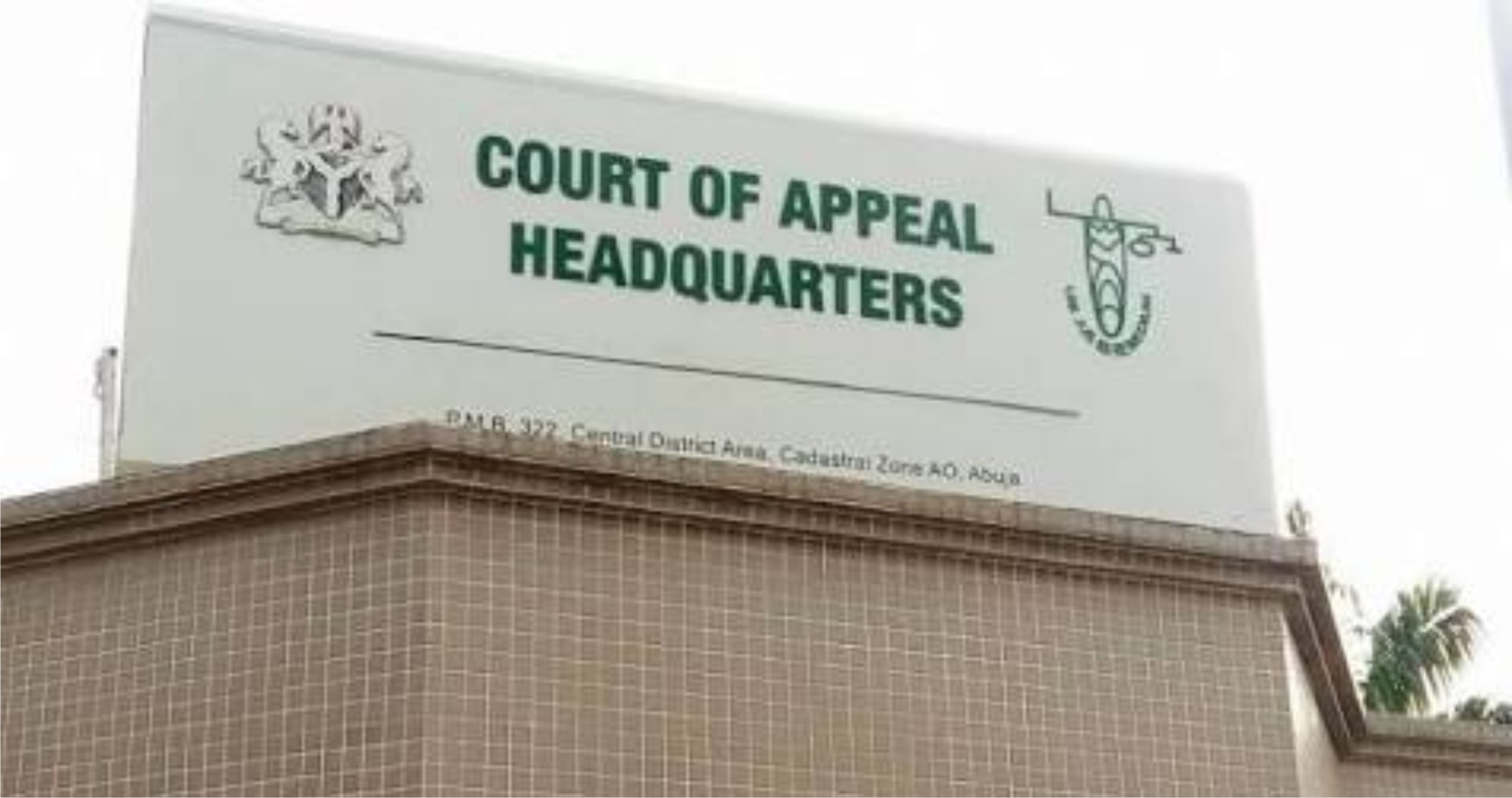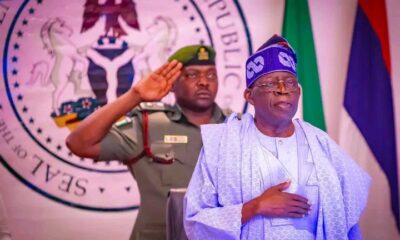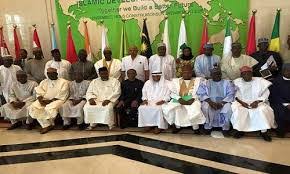Politics
Appeal Court Affirms Hyacinth Alia As Benue Governor

The Court of Appeal in Abuja, on Monday, affirmed the election of Gov. Hyacinth Alia of the All Progressives Congress (APC) as governor of Benue State.
The appellate court dismissed the appeal filed by the governorship candidate of the Peoples Democratic Party (PDP), Titus Uba, challenging the election of Mr Alia.
The candidate of the PDP in the March 18 governorship election had approached the appellate court to set aside the judgement of the tribunal, which upheld Mr Alia’s election.
Mr Uba, among other things, alleged that Mr Alia’s deputy, Samuel Ode, presented a forged certificate to the Independent National Electoral Commission (INEC), contrary to Section 182(1)(j) of the Federal Republic of Nigeria, 1999 (as amended).
He also claimed that Mr Alia’s name was submitted less than 180 days before the election date, and Mr Ode was also not submitted to INEC after the party conducted a further re-run primary election.
A three-member panel of the tribunal, headed by Justice Ibrahim Karaye, dismissed the petition on the ground that it was a pre-election matter and was statute-barred.
Ruling on the appeal on Monday, a three-member panel led by Justice Onyekachi Aja Otisi held that Mr Uba failed to prove beyond reasonable doubt the allegations of forgery against Mr Ode.
“No other form EC9 was presented. To prove forgery, two documents must be produced: the original and the forged document. The appellant failed to prove an element of forgery by not making available the documents “
Citing Section 29(5) of the Electoral Act, the court held that the high court and not the tribunal have the jurisdiction to hear the matter.
It added that the appellant lacked the locus standi to challenge the qualification of the deputy governor since he was not part of the party’s primary.
The appellate court also held that the rerun primary election was conducted in obedience to a court order, adding that the timeframe prescribed for the submission of names by the Electoral Act will collapse.
“There is a difference between an election conducted based on court order and that of the electoral act. The timeline of the act will collapse when there is a court order.
“The appeal hereby fails. Parties shall bear their own cost,” the court held.
Politics
INEC Denies Registering New Political Parties

The Independent National Electoral Commission (INEC) says it has not registered any new political parties.
The commission gave the clarification in a statement on its X (formerly Twitter) handle last Wednesday.
It described the purported report circulated by some online social media platforms on the registration of two new political parties by INEC as fake.
“The attention of INEC has been drawn to a fake report making the rounds about the registration of two new political parties, namely “Independent Democrats (ID)” and “Peoples Democratic Movement (PDM)”.
“For the avoidance of doubt, the commission has not yet registered any new party. The current number of registered political parties in Nigeria is 19 and nothing has been added,” it stated.
The commission recalled that both ID and PDM were registered as political parties in August 2013.
INEC further recalled that the two were deregistered in February 2020 in accordance with Section 225A of the 1999 Constitution of the Federal Republic of Nigeria.
The commission, therefore, urged the public to disregard the said report.
Politics
You Weren’t Elected To Bury People, Tinubu Tells Alia

President Bola Tinubu has asked Governor Hyacinth Alia to work more for peace and development of Benue State, saying he was elected to govern, not to bury people.
The President said this while addressing stakeholders at the Government House, Markudi, last Wednesday.
He also called on the governor to set up a peace committee to address some of the issues in the state.
The meeting included the Secretary to the Government of the Federation (SGF), George Akume, traditional rulers, and former governors of the state.
The governors of Kwara, Imo, Kogi, Plateau, Ondo, and Nasarawa states also attended the meeting.
“Let us meet again in Abuja. Let’s fashion out a framework for lasting peace. I am ready to invest in that peace. I assure you, we will find peace. We will convert this tragedy into prosperity,” he said.
President Tinubu urged Governor Alia to allocate land for ranching and directed the Minister of Agriculture and Food Security to follow up.
“I wanted to come here to commission projects, to reassure you of hope and prosperity, not to see gloomy faces. But peace is vital to development.
“The value of human life is greater than that of a cow. We were elected to govern, not to bury people”, he stressed.
He charged Governor Alia on working with the Federal Government to restore peace.
“Governor Alia, you were elected under the progressive banner to ensure peace, stability, and progress. You are not elected to bury people or comfort widows and orphans. We will work with you to achieve that peace. You must also work with us”, he said.
In his remarks, Governor Alia appealed to the Federal Government to establish a Special Intervention Fund for communities affected by repeated violent attacks across the state.
“Your Excellency, while we continue to mourn our losses and rebuild from the ashes of pain, we humbly urge the Federal Government to consider establishing a special intervention fund for communities affected by these incessant attacks in Benue State,” he said.
Governor Alia said the fund would support the rehabilitation of displaced persons, reconstruction of destroyed homes and infrastructure, and the restoration of livelihoods, especially for farmers.
He reiterated his support for establishing state police as a lasting solution to insecurity.
The governor pledged his administration’s full commitment to building a safe, stable, prosperous Benue State.
Also speaking at the meeting, the Chairman of the Benue State Traditional Rulers Council, Tor Tiv, Orchivirigh, Prof. James Ayatse, praised President Tinubu for being the first sitting President to personally visit victims in the hospital in the wake of such a tragedy.
He thanked the President for appointing notable Benue indigenes into key positions, including the Secretary to the Government of the Federation and the Minister of Water Resources and Sanitation, Professor Joseph Utsev, while expressing hope that more appointments would follow.
Politics
Gowon Explains Why Aburi Accord Failed
Former Head of State, Gen. Yakubu Gowon (ret’d), says the Aburi accord collapsed because Chukwuemeka Ojukwu wanted regional governors to control military zones.
Gen. Gowon was Nigeria’s military ruler from 1966 until 1975 when he was deposed in a bloodless coup while Ojukwu was military governor of the then Eastern Region in that span.
In a live television interview recently, Gen. Gowon narrated what transpired after the agreement was reached in Aburi, a town in Ghana.
The meeting that led to the accord took place from January 4 to 5, 1967, with delegates from both sides of the divide making inputs.
The goal was to resolve the political impasse threatening the country’s unity.
The point of the agreement was that each region should be responsible for its own affairs.
During the meeting, delegates arrived at certain resolutions on control and structure of the military. However, the exact agreement reached was the subject of controversy.
The failure of the Aburi accord culminated in Nigeria’s civil war, which lasted from July 6, 1967, to January 15, 1970.
Speaking on what transpired after the agreement, Gen. Gowon said the resolutions should have been discussed further and finalised.
The ex-military leader said he took ill after arriving in Nigeria from Aburi and that Ojukwu went on to make unauthorised statements about the accord.
Gen. Gowon said he did not know where Ojukwu got his version of the agreement from.
“We just went there (Aburi), as far as we were concerned, to meet as officers and then agree to get back home and resolve the problem at home. That was my understanding. But that was not his (Ojukwu) understanding,” he said.
Gen. Gowon said Ojukwu declined the invitation, citing safety concerns.
“I don’t know what accord he (Ojukwu) was reading because he came to the meeting with prepared papers of things he wanted. And, of course, we discussed them one by one, greed on some and disagreed on some.
“For example, to give one of the major issues, we said that the military would be zoned, but the control… He wanted those zones to be commanded by the governor.
“When you have a military zone in the north, it would be commanded by the governor of the military in the north, the military zone in the east would be commanded by him. Of course, we did not agree with that one”, Gen. Gowon added.
Ojukwu died on November 26, 2011 at the age of 78.
-
Politics5 days ago
Eno’s Defection: Collaborate With PDP Defectors, Akpabio Urges APC Members
-
Niger Delta5 days ago
FG Lauds Oborevwori’s Bold Initiatives In Delta
-
Rivers5 days ago
FIDA, PCRC Trains Police Officers On How To Handle Paralegal Cases In Rivers
-
Niger Delta5 days ago
C’River Commences Inquiry Into NDDC’s Project Inauguration Disruption
-
Politics5 days ago
Gowon Explains Why Aburi Accord Failed
-
Niger Delta5 days ago
Diri To Deliver UNIPORT’s 35th Convocation Lecture July 25th … As UNIPORT’s Mgt Visits Bayelsa
-

 News5 days ago
News5 days agoFG’ll Unlock Potential Of All States, Says Tinubu
-

 News5 days ago
News5 days agoNEF Decries Benue Killings As Genocide, Calls For Probe

